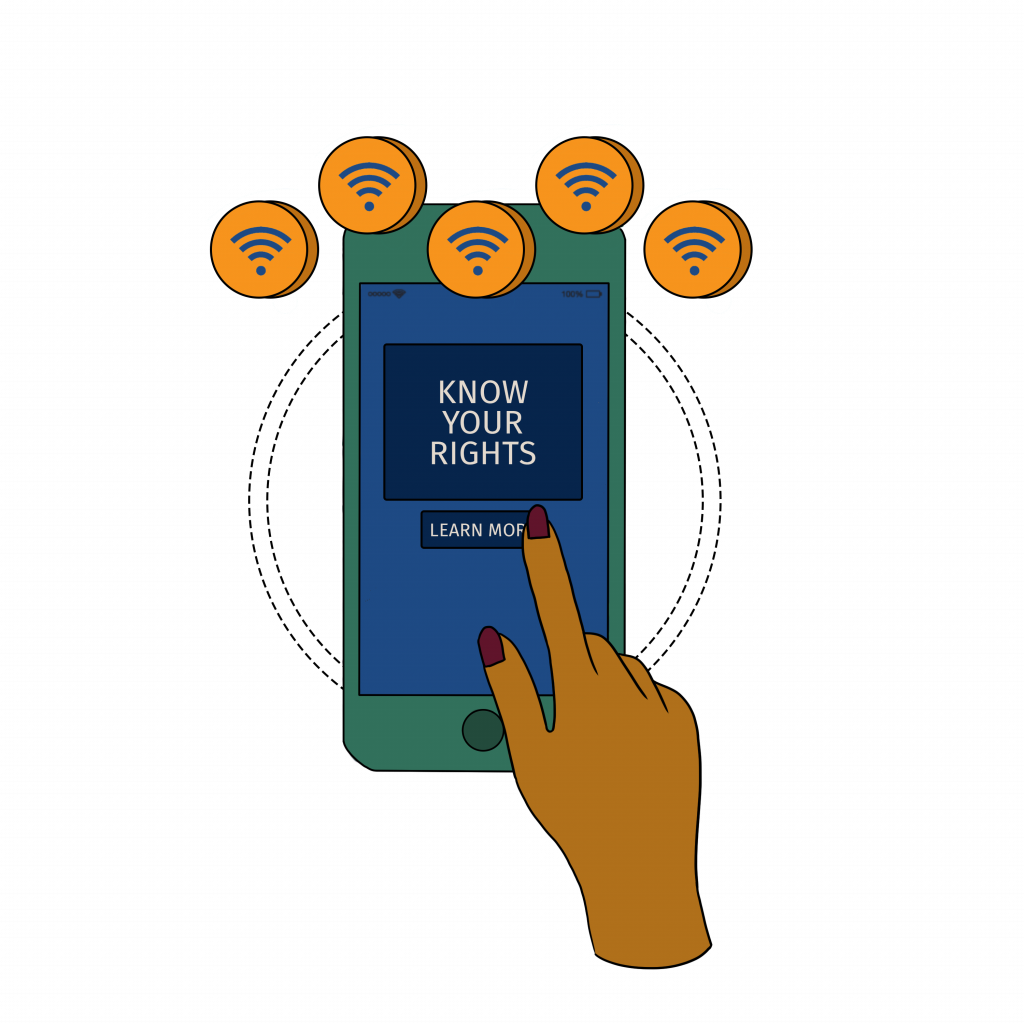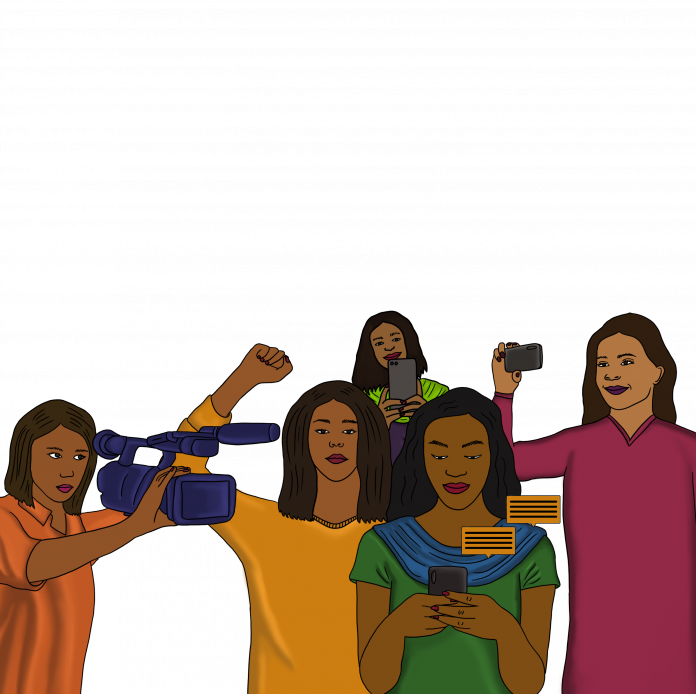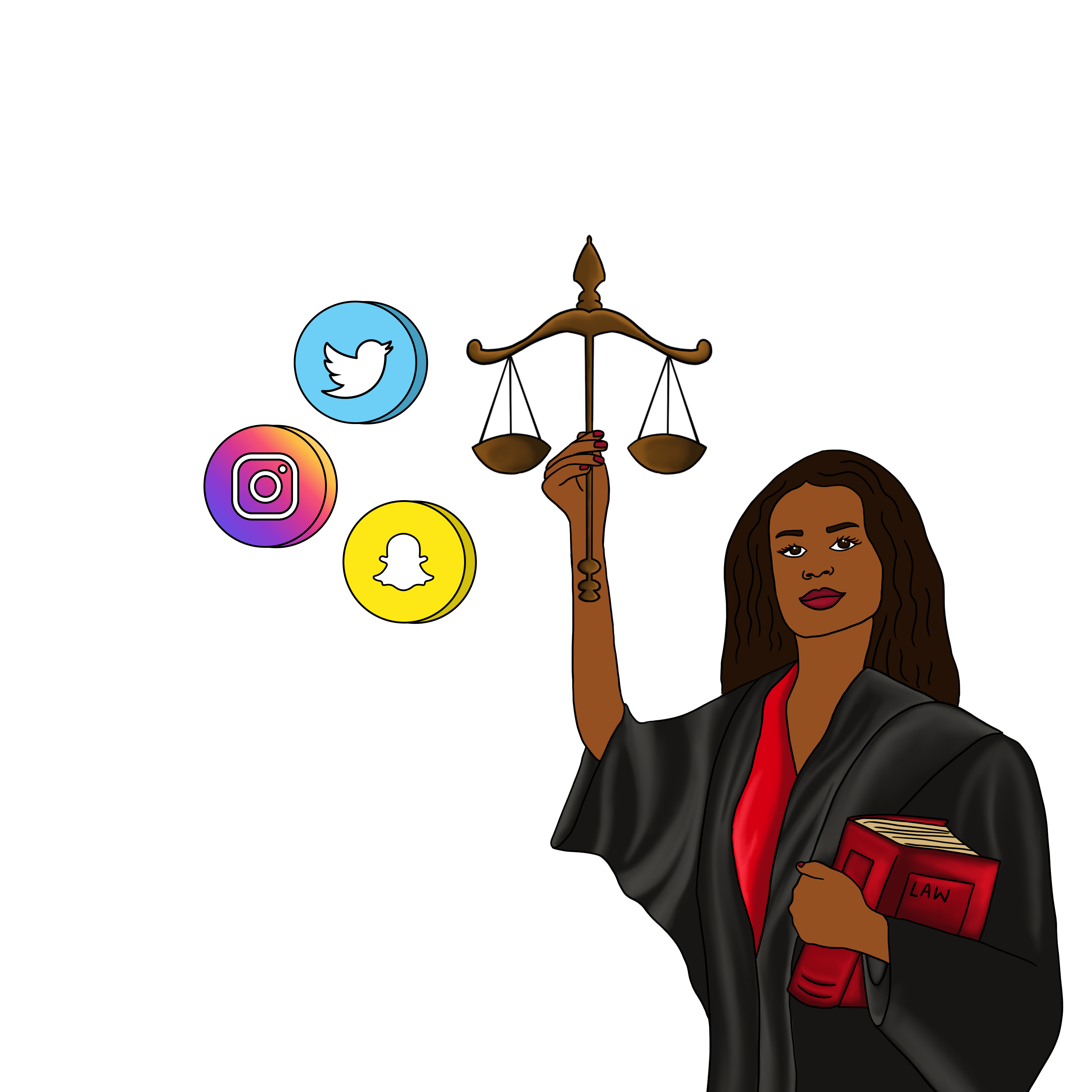By Ambreen Shabbir
When Lina Ben Mhenni, a Tunisian blogger, tweeted about the riots in her country in 2011, little did she know that her social media posts would shape the future of not only her own country but also the entire region. She was not alone in the activism, as many Tunisian women emerged on social media, claiming space and expressing dissent against the government simultaneously. While the credit of the Arab Spring is majorly given to social media, this is not an isolated example of how the internet can play an instrumental role in activism, resistance, and revolution. In that specific case, things spiraled out of control real fast, which highlighted the fact how deep-seated fault lines in a society and the use of modern technology can become a lethal combination for those sitting at the helm of affairs. Besides the cruciality of the internet, it showed how women activists have played a role in changing the dynamics of the political and social landscape despite having limited access to spaces and living in a conservative society. There have been several waves of feminism in the Arab countries as per the climate in their countries and demands of their time.
The same parallels can be drawn with Pakistan—a conservative country with limited exposure and access for women. In Pakistan, female activists have played a prominent role in the political movements while propagating the cause for their own rights. From Fatima Jinnah to Asma Jahangir, women activists have propounded dissent against undue practices. These specific eras show different waves of feminism which are indigenous and should be considered through the lens of Pakistani dynamics rather than Western. With increased internet permeability and wider social media usage, the dynamics, as with every other social current, of feminism have evolved as well, paving the way for cyberfeminism that also keeps evolving with time. On one hand, it is quicker and more convenient to generate and spread a narrative—not to mention how far-reaching the ripples created by that narrative are. But on the other hand, the narrative can become controversial too by the opposing groups. The negative sentiment against the feminist ideals (which is a sine-qua-non in conservative societies) can be exacerbated by misleading notions and misinformation campaigns.
What is cyberfeminism?
The term cyberfeminism was coined in the 1990s with an emphasis not laying down an exact definition of the term to keep it open and all-encompassing like the digital media sphere. Since then, the term has been serving different purposes and varying dimensions of feminism. One of the major prongs of this term is the argument that technology is considered or perceived as a masculine domain—something that men are good at and engage in. This perception still stands both in the Western and Eastern societies despite many contributions of women to IT. Another dimension, inter alia, of this term is the use of internet by feminists to propagate their cause and spread awareness about gender equality and rights of marginalized genders. As of now, and particularly for this article, the term has been used in the latter sense. Many women (some of whome were participants of the interviews for this piece) who refuse to associate with the label “feminism” do consider the internet as an important tool for women to learn about their rights as well as other things and also for their creed to progress in IT.
Cyberfeminism in Pakistan
Just like in every other country, feminism and other forms of activism go hand in hand in Pakistan. Various movements like Women’s Democratic Front (WDF) and Women Action Forum are taking on various causes that are intersectional in nature. Along with organizations, many women in the individual capacity have also been propagating feminist ideal while claiming their space and encouraging others to do so as well. Doing so, both the organizations and the individuals are generating a unique social capital that has a significant influence on the society. These narratives and debates have both positive and negative implications (negative being the issue becoming controversial and deliberately propagated as an attack against the Eastern culture and values). From expressing their resentment against a harassment incident or that of sexual abuse to partaking in debate on whether desi households should limit women’s mobility or victim blame if one speaks out, the Pakistani social media has seen it all, although not every debate makes the top trend.
If one gauges the social capital generated by cyberfeminism in Pakistan, it surfaces that the movement has really come through. Its ripples can be felt among the masses, especially women, who are neither influencers nor activists. This effect can be evident from the statements of the women quoted in this article. Notably, some of them prefer not to identify themselves as feminists. Many of them maintained that the internet has enabled them to question the status quo.
Dr. Unber Shafiq, a public health specialist, says, “Women have long been conditioned to believe in certain social norms as part of religion. Many of them never dared to question those norms, but social media came as a platform where they could raise questions and get the right answers; not the kind Malala got when she questioned her mother on why a partnership can’t work, why get married, to which she was told that marriage is beautiful, you have to get married.”
She further states that the online debate on the society’s set rights and wrongs have helped people develop their own independent perspectives. “I believe we have found a community that encourages us to make decisions that are otherwise considered haram, not in the book of Allah, but by social standards. Many social media users have opened up about topics never discussed before. From helpful content on postpartum depression to guidance on dealing with domestic violence to creating financial stability among women to parenting advice, so much has come our way through social media. Our elders would have never exposed us to this information, as it negates the long held false beliefs of our previous generations. But thanks to social media, we now have muftis from across the world coming live on the internet and busting false information surrounding women.”
Maryam Khalid, a digital media journalist and an M.Phil student says that she managed to deal with her ‘pariah complex’ through social media.
“I took the basic idea about feminism or women’s rights from my mother, even though she is not very much educated. My parents belong to a humble background, as is the case with a typical middle-class family. Relatives are also very traditional and somewhat conservative. Despite this background, my mother had a very different approach. She advocated for the right of women to do jobs and get education. She would say that getting married or having kids can wait and is not the sole purpose of life. So, I heard these notions growing up. I knew that my mom’s beliefs were not shared by the majority. Even my education was from government schools where this kind of discussion does not happen usually. Even my friends didn’t share these ideas. So, I believed that my mom was very different from the rest of the people, and she was portrayed as such too. But then I joined social media and I got to know that there is a world beyond my friends and relatives. And this world might keep the same views as held by me (inspired by my mom). So, when I got to see the same ideals on social media, I felt happy and relieved that my mom and I were not the odd one out. What we believe in is a fact and shared by many people. Although I did not know these ideals or beliefs as feminism, I did recognize that these people are saying the same things my mom says. That’s why my interest grew further in this narrative. I became curious about how people frame the arguments on gender equality or women’s rights and how I can convey my views on it. How can people reason about it? So, I learned these things. I did not study any gender-specific subject in my university, but social media taught me a lot in this regard. So, when I joined the media, I used to write on social issues, and I never felt any difficulty in writing on these issues. I never felt that I didn’t have enough knowledge on it. It was an amazing thing for myself too that I was good at writing on something that I never studied during my educational career. But unconsciously, the debates I had been reading on social media were getting stored in my mind and developing my argumentative ability as well as refining my opinion.”
Sehrish Qureshi, an e-journalist and an associate producer of social media at an international media house, also speaks about the impact the internet has had on her.
“Online narratives of feminism have positively impacted my thoughts and modernized my ideology. I get to learn more about gender equality and women’s rights on the internet, as whenever an incident happens, it is first reported on social media and then people start giving their perspective regarding the issue. The analysis by experts has made me realize how many people are targeted just because of their gender. I also got to learn my rights as a human being and as a citizen of a free country. Even common people (who are not gender experts or activists) have made me realize how certain segments prefer the status quo and want to suppress the other, marginalized genders. “
Alishba Naeem Ansari, a public policy researcher, says, “I’ve been using online mediums for socializing, advocacy and information for at least 10 years. Therefore, I have to say that I am part of the generation that grew up adapting to all the changes that were happening in this time span. As a woman, online spaces are not any different in terms of facing harassment. Hence, I’ve been very cautious of putting up personal information or pictures recently. Part of it is because of increased awareness on cyber engagements and privacy and part of it is because of the breach of privacy itself. At the same time, we are able to find supportive communities online and people who help each other by reporting harmful content. Online solidarity groups have also helped many women find social and legal support to overcome difficulties in life. So, as a whole, it’s been an informative experience.”
Regarding the negative aspects of the internet, she says, “First of all despite the criticism in online spaces it does give you a voice and outlet to have your views expressed. I think having the right to express and be heard is a fundamental right that women are, let me say this, “casually” denied in public spaces and families. For me that’s where it all begins. The Internet has allowed me to gain that freedom and along the way learn about my rights and how I can actualize them.
Also I think some of us are lucky to have been active online before algorithms were introduced because we were not limited to ideas of our own liking.”
Ummarah Sheraz, a culture writer, states, “It was largely literature that sparked my feminist awakening, but there is no denying the internet burst my puritan bubble. Like how almost everyone jumps the bandwagon for social media clout. Yet few stand for women empowerment and emancipation in the socio-political and politico-economic sphere.
With easier access to information online, I do believe it helps educate people on women’s rights. This has to a certain extent pushed back against the patriarchy.”
Hajra Tassaduq, an aspiring media person, agreed with the above accounts and maintained that the internet has helped her gather awareness on her rights as a woman. “I learned that there is a law against domestic abuse that includes economic and mental abuse too. I also found out that there are certain lacunas in the law and some laws are absent altogether that can provide women more security and freedom.”
Challenges to Cyberfeminism
The major challenge to cyberfeminism in Pakistan is malicious, misinformation campaigns against the feminist cause and people’s tendency to buy them.
One example is the allegation by certain media personalities that women were chanting sacrilegious slogans at Aurat March. The social media users jumped on the bandwagon and masses lashed out severely at the AM organizers and activists. Later, it turned out that the video was doctored, and the subtitles were deliberately captioned wrong.
While this act itself was blasphemous, nobody paid attention to this fact. It was good that the issue did not escalate, or else, we would have a fatwa against the organizers. Another incident that also relates to Aurat March 2020 was when someone shared a video of a naked woman walking on the street in Islamabad with a claim that the act was a part of Aurat March. The truth was that the video was dated three years back and was of a patient of a mental disability. The examples are aplenty in this regard. These two misinformation campaigns got refuted in a short time and thus could not gain traction for long. However, the same does not happen to every malicious campaign. The debunking does not always reach the eyes of the masses, and the cause remains marred in controversy and negativity.

Despite the challenges, cyber feminism has opened up new avenues for feminists to gather and organize on issues previously ignored by the mainstream media also. The new avenues have and will continue being used by feminists across the world to make noise on issues that matter.






